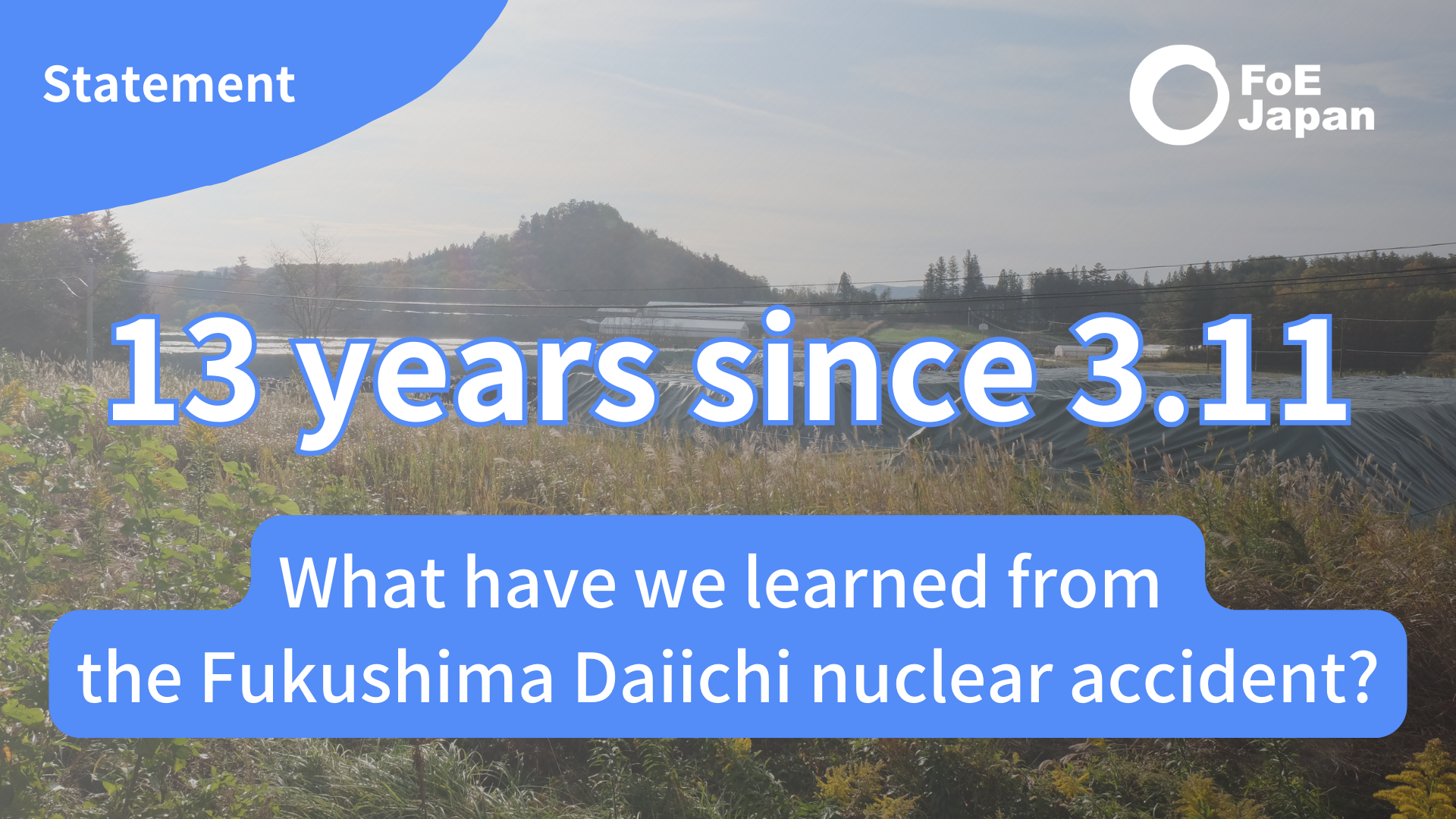Statement: 13 years since 3.11 - What have we learned from the Fukushima Daiichi nuclear accident?

March 11, 2024
FoE Japan
Statement: 13 years since 3.11 – What have we learned from the Fukushima Daiichi nuclear accident?
Thirteen years have passed since the Great East Japan Earthquake on March 11, 2011, and the subsequent TEPCO Fukushima Daiichi nuclear power plant accident.
A large number of people were forced to leave their hometowns and evacuate. They lost their livelihoods, meaning in life, and community. And many are still facing financial difficulties.
The nuclear disaster is still not over. Efforts at the Fukushima Daiichi nuclear power plant to remove fuel debris (melted nuclear fuel that has cooled and solidified) have hit many snags, and even the trial removal has been postponed multiple times. Costs for compensation, decommissioning and decontamination have already ballooned to 23 trillion yen (over US$200 billion, or over $1,600 per person in Japan) according to the government. These costs should have been paid by TEPCO (Tokyo Electric Power Company), which is primarily responsible for the disaster. But the general public, including the victims and future generations, are being forced to bear the responsibility and pay the costs. To this day, the government and TEPCO have failed to clearly take responsibility.
In August 2023, the discharge of so-called ALPS-treated (but still contaminated) water into the Pacific Ocean began. The total quantities of radioactive materials released have not been publicly disclosed. Viable alternatives such as mortar solidification were never seriously discussed. The government had promised that it would not take any measures without obtaining the “understanding” of those involved, but has completely reneged upon its promise. With these issues left unaddressed, propaganda that the ALPS-treated water “is safe" dominates the media and the internet, creating an atmosphere in which anyone who voices concerns ends up being labeled as a “perpetrator of harmful rumors.”
There has also been public opposition to the government’s plans to reuse soil materials containing low-level radioactive contamination from decontamination projects for public works projects such as berms and road construction, but here too, there is pressure to silence those voices, saying they stand in the way of reconstruction efforts.
The government is spending huge amounts of money on advertising agencies to promote a one-sided narrative. In effect our taxpayers’ money is being used to deny the public space for speech and healthy debate.
Both the discharge of ALPS-treated contaminated water into the ocean and the reuse of contaminated soil will only disperse radioactive materials further into the environment. These materials should be centrally managed, not spread around, and ultimately do not help the reconstruction of Fukushima. It must be remembered that these decisions were made without proper formal discussion and without a social consensus.
What have we learned from the nuclear accident?
We have learned that once a nuclear disaster happens, the environment gets contaminated over a wide area, many people irreplaceably lose what they cherish, communities, societies, and families are split and divided, and serious conflicts arise.
In 2023, less than 13 years after the nuclear disaster, the government made a dramatic shift backwards to once again promote nuclear power. Adopted in the name of decarbonization the GX Promotion Act supports the restart of nuclear power plants and the extension of their operating lives, and the promotion of investments in the development and construction of so-called “next-generation innovative” nuclear reactors. Associated with that legislation, the Diet also passed amendments to five laws, including the Electricity Regulation Act and the Electricity Business Act.
During the Noto Peninsula earthquake that occurred on New Year’s Day 2024, the Shika Nuclear Power Plant located near the epicenter of the earthquake was also struck by strong tremors, causing many problems. Fortunately, no catastrophic accident occurred there this time, as the reactors were in the midst of a long-term shutdown. However, the incident once again highlighted the vulnerability of nuclear power plants and, in particular, the questionable nature of faith in nuclear disaster prevention.
Nuclear power is fraught with many serious problems, such as radioactive contamination and human rights violations at every stage of the nuclear cycle, from uranium mining to fuel processing, nuclear plant operation, nuclear fuel disposal, and plant decommissioning. Meanwhile, the cost of nuclear power continues to rise. It is now the most expensive power source. Nuclear power plants are a symbol of an unsustainable society that continues to use such copious amounts of electricity and energy, and of an unjust structure in which the profits from nuclear power enrich a small portion of the population, while imposing the burdens on communities that are trying to deal with local depopulation, and on future generations. We must change this structure.
FoE Japan would like to connect with people all over the country and around the world and continue working together to realize a society that is based on safe and sustainable energy, surviving and thriving without all the risks and costs of nuclear power.